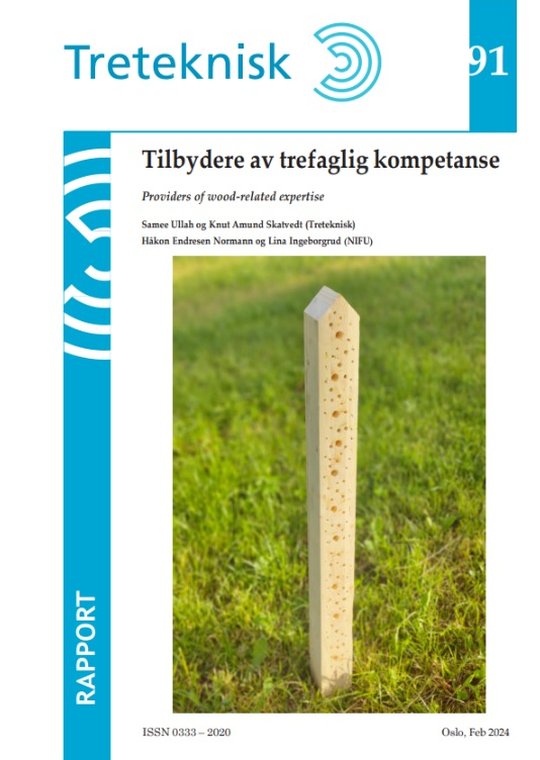91: Tilbydere av trefaglig kompetanse
Forfattere: Samee Ullah og Knut Amund Skatvedt (Treteknisk)
Håkon Endresen Normann og Lina Ingeborgrud (NIFU)
Rapport nr. 91, 2024
27 sider
200 kr (Gratis for medlemmer)
Last ned
Sammendrag
Denne rapporten gir en oversikt over kompetansebehov og utvikling innen den norske bygg- og treindustrien, med et spesielt fokus på økt bruk av tre for å redusere klimagassutslipp. Norge har forpliktet seg til å kutte utslipp med 55 % fra 1990-nivåer, og byggsektoren, som står for en betydelig del av utslippene, har et stort potensial for reduksjon gjennom blant annet økt bruk av tre. Dette krever innovasjon og kompetanseutvikling på flere nivåer, inkludert teknisk og digital kompetanse samt kunnskap om bærekraft og sirkulær økonomi.
Rapporten belyser også tre viktige aktører innenfor trefaglig kompetanseutvikling i Norge, Fagskolen Innlandet, Fagskolen Agder og Norsk Treteknisk Institutt. I rapporten beskrives deres rolle i å møte industrien sine behov for kompetanse, og utfordringer de står overfor, inkludert behovet for bedre koordinering og samarbeid mellom ulike utdanningstilbydere og næringslivet. Videre understrekes det at en grønn omstilling av byggsektoren ikke bare er avhengig av teknologiske innovasjoner, men også av menneskelige faktorer som læring, kunnskapsdeling og kompetanseutvikling.
Summary
This report provides an overview of the competency needs and development within the Norwegian construction and timber industries, with a specific focus on increased timber utilization to mitigate greenhouse gas emissions. Norway has committed to reducing emissions by 55 % from 1990 levels, and the construction sector, which accounts for a significant portion of emissions, holds substantial potential for reduction through, among other strategies, increased timber utilization. This necessitates innovation and competency development across multiple levels, including technical and digital proficiency as well as knowledge of sustainability and circular economy principles.
The report also elucidates the roles of three key actors in timber-related competency development in Norway: Fagskolen Innlandet, Fagskolen Agder, and the Norwegian Institute of Wood Technology. Their roles in addressing the industry's competency needs are described, alongside the challenges they face, including the necessity for improved coordination and collaboration between various educational providers and the business sector. Furthermore, it is emphasized that the green transformation of the construction sector relies not only on technological innovations but also on human factors such as learning, knowledge sharing, and competency development.
